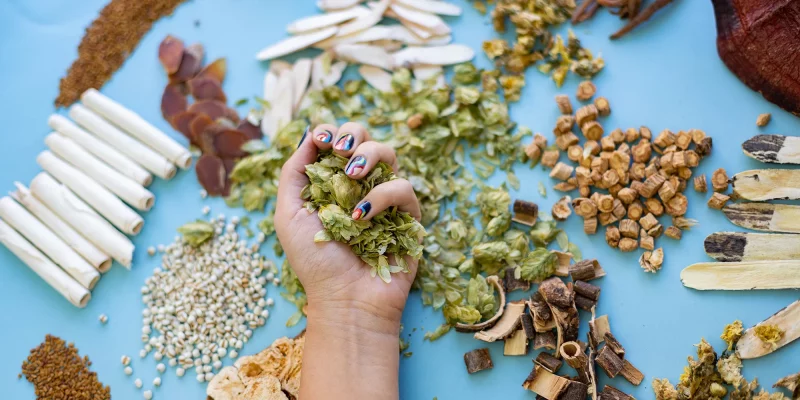Key Takeaways:
- Herbal remedies have a rich history dating back to ancient civilizations, such as the Egyptians, Greeks, and Chinese.
- Ancient cultures played a vital role in the development of traditional medicine and herbal remedies.
- Pioneering herbalists like Dioscorides and Nicholas Culpeper contributed significantly to our understanding of medicinal plants.
- Indigenous communities hold valuable knowledge of plant-based medicine and traditional healing practices.
- Medicinal plants contain active compounds that contribute to their healing properties.
- Herbal remedies interact with the body through various mechanisms to address different conditions.
- There are misconceptions and myths surrounding herbal medicine that need to be debunked.
- Herbal remedies can be used for common ailments such as digestive issues, stress, and anxiety, and to boost immunity.
- Growing a medicinal herb garden, practicing ethical harvesting, and integrating herbal medicine into your daily routine are ways to harness the power of medicinal plants.
- The History and Discovery of Herbal Remedies
Herbal remedies have a rich history that dates back to ancient civilizations. For thousands of years, our ancestors relied on the healing power of medicinal plants to treat various ailments and promote overall well-being. Ancient cultures, such as the Egyptians, Greeks, and Chinese, were pioneers in using plants as medicine.
1.1 Ancient Cultures and Traditional Medicine
Ancient cultures played a vital role in the development of traditional medicine and herbal remedies. The Egyptians, for example, documented the use of plants for medicinal purposes on ancient papyri, such as the Ebers Papyrus and the Edwin Smith Papyrus. These documents contain detailed information about different plant-based remedies used by the Egyptians for treating various conditions.
The Greeks also made significant contributions to the field of herbal medicine. Hippocrates, often referred to as the “Father of Medicine,” advocated for the use of herbs and plants in healing. He believed in treating the root cause of the disease rather than merely alleviating symptoms.
In China, traditional Chinese medicine (TCM) has a history of over 2,000 years. TCM emphasizes the use of herbal remedies to restore the balance of Yin and Yang within the body. Chinese herbal medicine, based on ancient texts like the Huang Di Nei Jing (Yellow Emperor’s Inner Canon), continues to be widely practiced today.
1.2 Pioneering Herbalists and Their Contributions
Throughout history, herbalists have played a significant role in advancing our understanding of medicinal plants. One notable figure is Dioscorides, a Greek physician who authored “De Materia Medica,” a comprehensive pharmacopeia that described the properties and uses of hundreds of medicinal plants. This work served as a reference for herbalists for centuries.
During the Renaissance, European herbalists continued to expand their knowledge of herbal remedies. Nicholas Culpeper, an English herbalist, published “Culpeper’s Complete Herbal” in the 17th century, which became one of the most influential herbal guides in Europe. His book provided detailed information on the medicinal properties of plants, making herbal medicine accessible to the general public.
1.3 Uncovering the Secrets of Indigenous Healing Practices
Indigenous cultures around the world have long held deep knowledge of plant-based medicine. From the Native American tribes to the Aboriginal people of Australia, these communities have passed down their traditional healing practices for generations.
Modern researchers have started to recognize the value of indigenous knowledge and the potential of medicinal plants used by these cultures. By collaborating with indigenous communities, scientists have been able to discover unique plant species and uncover traditional remedies for various ailments.
- Exploring the Science Behind Herbal Remedies
While traditional herbal medicine has been practiced for centuries, modern science has contributed to our understanding of how herbal remedies work in the body. Researchers have aimed to identify the active ingredients in plants and study their effects on human health.
2.1 The Active Ingredients in Medicinal Plants
Medicinal plants contain a plethora of active compounds that contribute to their healing properties. These compounds can include alkaloids, flavonoids, terpenoids, and phenolic acids, among others. Each plant species has its unique combination of active ingredients, which determine its medicinal properties.
For example, the active compounds in Echinacea, a popular herb for immune support, include alkamides, polysaccharides, and caffeic acid derivatives. These compounds work together to stimulate the immune system and fight off infections.
2.2 How Herbal Remedies Work in the Body
Herbal remedies interact with the body through various mechanisms. Some herbs may act as anti-inflammatory agents, reducing inflammation and providing relief for conditions such as arthritis or digestive disorders. Others may have antimicrobial properties, helping to combat bacterial or viral infections.
One example is the herb St. John’s Wort, which is commonly used for its antidepressant properties. It is believed to work by inhibiting the reuptake of certain neurotransmitters, such as serotonin, in the brain, thereby increasing their levels and improving mood.
2.3 Debunking Myths and Unveiling the Truth About Herbal Medicine
Despite the proven efficacy of many herbal remedies, there are still misconceptions and myths surrounding herbal medicine. It is important to separate fact from fiction to fully appreciate the benefits of herbal remedies.
One common myth is that herbal remedies are completely safe and free from side effects. While herbal medicines are generally considered safe when used correctly, they can still have adverse effects if misused or taken in excessive doses. It is crucial to consult with a healthcare professional or a qualified herbalist before incorporating herbal remedies into your healthcare routine.
- Common Ailments and Herbal Solutions
Herbal remedies can be used to address a wide range of common ailments. Many people turn to herbal medicine as a natural and gentle alternative to conventional pharmaceuticals.
3.1 Natural Remedies for Digestive Health
Herbs like peppermint, ginger, and chamomile have long been used to soothe digestive issues such as indigestion, bloating, and nausea. Peppermint oil, for example, has been shown to relax the muscles of the gastrointestinal tract, providing relief from symptoms of irritable bowel syndrome (IBS).
Ginger has also been hailed for its digestive benefits. It can help stimulate digestion, reduce inflammation in the gut, and alleviate symptoms of nausea and vomiting.
3.2 Herbal Alternatives for Stress and Anxiety Relief
Many individuals seek herbal remedies to manage stress and anxiety, as they offer a more holistic approach compared to prescription medications. Some herbs known for their calming properties include chamomile, lavender, and ashwagandha.
Chamomile tea, for instance, has been used for centuries as a natural remedy for promoting relaxation and reducing anxiety. It contains compounds that bind to receptors in the brain associated with stress and anxiety, promoting a sense of calmness.
3.3 Herbal Remedies to Boost Immunity and Fight Infections
Herbal remedies can also be valuable allies in boosting the immune system and fighting off infections. Echinacea, for example, is commonly used to support the immune system and prevent the onset of the common cold or flu.
Garlic, with its potent antimicrobial properties, has been used for centuries to combat various infections. It contains compounds that can help inhibit the growth of bacteria, viruses, and fungi.
- Harnessing the Power of Medicinal Plants
With the increasing interest in natural remedies, many individuals are exploring ways to harness the power of medicinal plants in their everyday lives.
4.1 Growing and Cultivating Your Own Medicinal Herb Garden
Growing your own medicinal herb garden can be a rewarding and cost-effective way to access fresh herbs for various remedies. It allows you to have control over the quality and sustainability of the plants you use.
When planning your garden, consider the specific needs of each plant, such as sunlight, soil type, and watering requirements. Some popular herbs to consider growing include lavender, mint, and calendula.
4.2 Wildcrafting and Ethical Harvesting of Medicinal Plants
For those who prefer to gather medicinal plants from their natural habitats, ethical harvesting practices are essential to ensure the continued abundance of these valuable resources.
When wildcrafting, it is crucial to educate yourself about sustainable harvesting techniques and respect the natural environment. Only take what you need, leave enough for the plant to regenerate, and avoid harvesting endangered species.
4.3 Integrating Herbal Medicine into Your Daily Wellness Routine
Incorporating herbal remedies and medicinal plants into your daily wellness routine can be as simple as enjoying a soothing cup of herbal tea, using herbal-infused oils for skincare, or incorporating herbal supplements into your diet.
However, it is essential to do thorough research and consult with a healthcare professional or a qualified herbalist before using herbal remedies. They can provide personalized advice based on your specific health needs and ensure any potential interactions or contraindications are considered.
Remember, herbal medicine should be seen as a complementary approach that works in harmony with conventional medical treatments rather than a substitute for professional medical advice.
FAQ
Question: What is herbal medicine? – Herbal medicine is a form of traditional medicine that uses plants and plant extracts for healing and promoting well-being. It has a rich history dating back to ancient civilizations and is based on the belief that medicinal plants contain active compounds that can address different health conditions.
Question: What role did ancient cultures play in the development of herbal medicine? – Ancient cultures like the Egyptians, Greeks, and Chinese played a vital role in the development of herbal medicine. They documented the use of plants for medicinal purposes and laid the foundation for traditional healing practices that are still followed today.
Question: Who were some pioneering herbalists and what were their contributions? – Dioscorides, a Greek physician, authored “De Materia Medica,” a comprehensive pharmacopoeia that described the properties and uses of hundreds of medicinal plants. Nicholas Culpeper, an English herbalist, published “Culpeper’s Complete Herbal,” which became a widely influential herbal guide. Their works contributed significantly to our understanding of medicinal plants.
Question: What is the science behind herbal remedies? – Modern science has contributed to understanding how herbal remedies work in the body. Researchers have identified the active ingredients in medicinal plants and studied their effects on human health. Herbal remedies interact with the body through various mechanisms, such as reducing inflammation or combating infections.
Question: Are there any myths surrounding herbal medicine? – Yes, there are some misconceptions and myths surrounding herbal medicine. One common myth is that herbal remedies are completely safe and free from side effects. While generally safe, herbal medicines can have adverse effects if misused. It is important to seek advice from healthcare professionals or qualified herbalists before using herbal remedies.
Question: What are some common ailments that herbal remedies can address? – Herbal remedies can be used to address common ailments such as digestive issues, stress and anxiety, and boosting immunity. For example, herbs like peppermint and ginger can soothe digestive problems, while chamomile and lavender are known for their calming properties.
Question: How can I harness the power of medicinal plants? – You can harness the power of medicinal plants by growing your own medicinal herb garden, practicing ethical harvesting of wild medicinal plants, and integrating herbal medicine into your daily wellness routine. These practices allow you to access fresh herbs, ensure sustainability, and incorporate herbal remedies into your lifestyle.
Question: How should I integrate herbal medicine into my daily wellness routine? – Integrating herbal medicine into your daily wellness routine can be as simple as enjoying a cup of herbal tea, using herbal-infused oils for skincare, or incorporating herbal supplements into your diet. However, it is important to do thorough research and consult with healthcare professionals or qualified herbalists for personalized advice.
Useful Resources:













Comments